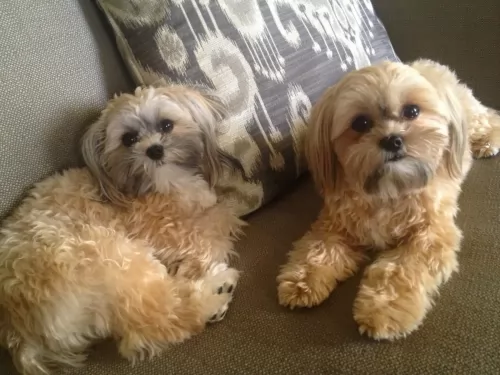 Petzlover
Petzlover Shorkie is originated from United States but Valley Bulldog is originated from Canada. Shorkie may grow 21 cm / 8 inches shorter than Valley Bulldog. Shorkie may weigh 29 kg / 63 pounds lesser than Valley Bulldog. Shorkie may live 3 years more than Valley Bulldog. Shorkie may have less litter size than Valley Bulldog. Shorkie requires Moderate Maintenance. But Valley Bulldog requires Low Maintenance
Shorkie is originated from United States but Valley Bulldog is originated from Canada. Shorkie may grow 21 cm / 8 inches shorter than Valley Bulldog. Shorkie may weigh 29 kg / 63 pounds lesser than Valley Bulldog. Shorkie may live 3 years more than Valley Bulldog. Shorkie may have less litter size than Valley Bulldog. Shorkie requires Moderate Maintenance. But Valley Bulldog requires Low Maintenance
 The Shorkie is a mix between a Yorkshire Terrier and a Shih Tzu. This little dog actually thinks he’s quite big. He is a great watchdog and a barker, and he is a loyal and loving member of his family. He will let you know if he thinks something is going on that shouldn’t be.
The Shorkie is a mix between a Yorkshire Terrier and a Shih Tzu. This little dog actually thinks he’s quite big. He is a great watchdog and a barker, and he is a loyal and loving member of his family. He will let you know if he thinks something is going on that shouldn’t be.
This hybrid combines two breeds known for their good looks, cuteness and personalities. Shorkies get their watchdog instincts and their loyalty to their people from the Shih Tzu and their personalities and good looks from the Yorkie. This designer breed has no known standard and every puppy is different, but traits from its founding breeds will remain. Both breeds have great personalities.
Regardless of the differences within the litter, because the personalities and adorableness of the two founding breeds are equal, all of the puppies will have those characteristics. They will all be energetic, playful and think they are big dogs. They will all love people and especially kids – playing and watching over them.
The Shorkie is intelligent, trainable, and snuggly. They will also have the stubborn trait that the two founding breeds can show at times. Developed in the United States, this crossbreed is extremely popular even though they have been in existence for only ten years or so. Breeders in the U.S. began to mix these two breeds in order to develop a cute, friendly and intelligent little dog that will cuddle on your lap – perfect lap dog.
Even if we already have breeds similar to the Shorkie, its development allows breeders to diversify and improve the genetics of the dogs. It is important that these be responsible breeders whose intentions are not financial but to legitimately improve the positive traits of each breed while sorting out the undesirable or weak traits. This is the positive side of the new designer breeds.
Even though it is still being developed, at least the Shorkie seems to be a success story for designer breeds as a loving, popular little dog. It will take a lot more time and a lot more development before the Shorkie becomes an actual recognized breed. At the moment it remains a hybrid, a crossbreed, a so called designer dog.
It will be at least 7-10 generations of careful and quality breeding before the Shorkies are potentially recognized as its own pedigree breed. It is important to breed Shorkies to Shorkies in order to develop a standard that could be accepted for a new breed by the AKC and UKC. Over time the puppies must become more and more standardized in their conformity to that new breed standard. Their physical appearance and their temperament will be standardized. At this stage the second generation of Shorkies is rare. Their popularity is rising in the United Kingdom. Both Britain and Ireland have a growing interest in this hybrid.
 The Valley Bulldog originates from Nova Scotia, Canada. It is thought that the Boxer, English Bulldog and the Olde English Bulldogge have been used to bring about the Valley Bulldog.
The Valley Bulldog originates from Nova Scotia, Canada. It is thought that the Boxer, English Bulldog and the Olde English Bulldogge have been used to bring about the Valley Bulldog.
 The Shorkie, being a cross between the Yorkshire Terrier and the Shih Tzu, and as such has physical and temperament characteristics from both breeds. They could be 50-50 but most likely each puppy will be more like one of the founding parents than the other. Because there is a lot of similarity between the founding breeds there is a lot of similarity between the Shorkies.
The Shorkie, being a cross between the Yorkshire Terrier and the Shih Tzu, and as such has physical and temperament characteristics from both breeds. They could be 50-50 but most likely each puppy will be more like one of the founding parents than the other. Because there is a lot of similarity between the founding breeds there is a lot of similarity between the Shorkies.
Their hair is either wavy or straight, but it is soft. It can be a wide variety of colors and usually they have a darker mask on the face. Usually they have the eyes of the Shih Tzu – large -but not protruding. Their muzzle is short, and the skull is round with triangle ears. Their bodies are compact, small with plenty of muscle for their size. They also have fine bones and short legs, with a thin curled tail.
 The Valley Bulldog stands at between 36 and 46cm in height and he weighs in the region of 18 – 36kg. He is actually a taller version of an English Bulldog.
The Valley Bulldog stands at between 36 and 46cm in height and he weighs in the region of 18 – 36kg. He is actually a taller version of an English Bulldog.
He is muscular and sturdy and has the true broad head of which the Bulldog is so familiar. He has small to medium floppy ears and a stump of a tail. He also has the flat muzzle.
The dog’s coat is short and smooth, making him fairly low maintenance, although he is a moderate shedder. It comes in typical Bulldog shades – tan, white, red, black and brindle.
The Valley Bulldog has an excellent nature, being completely non-aggressive, and when he has been trained and socialized you get a superb pet.
He’s intelligent so you won’t have any trouble learning any basic commands. He is able to get along with other pets in the home. He can be quite entertaining too as he becomes clownish, loving to be around his human family. He is also capable of being calm and gentle.
He makes a splendid playmate for children, loving the games as he is quite an energetic dog. He isn’t suited to life in a tiny home in the city because he loves to just run sometimes, and then he can be like a bull in a china shop.
 The Valley Bulldog is guaranteed to make you a splendid pet because he has such a sweet temperament.
The Valley Bulldog is guaranteed to make you a splendid pet because he has such a sweet temperament.
He is such a social, playful dog too. Because of his intelligence, you won't have any trouble teaching him some basic commands. You’ll be amused and entertained by this wonderful dog in your life as his warm personality will ensure you have a true friend in him.
 Many hybrids are in better health at least genetically than their parent breeds. Responsible breeders will breed any genetic issues out of their puppies. Still there are many health issues that the Shorkies are prone to. These include:
Many hybrids are in better health at least genetically than their parent breeds. Responsible breeders will breed any genetic issues out of their puppies. Still there are many health issues that the Shorkies are prone to. These include:
• Brachycephalic Airway Syndrome – “smashed face” causes problems with breathing, heat, flying and more.
• Glaucoma – Yorkshires have this, and it can be secondary to the lens Luxation.
 It can be sad watching a dog becoming less mobile as joint problems set in. The vet can recommend a diet which can help to manage joint disease. Also, the pain associated with joint problems can be debilitating for your pet and you will want to get your pet to the vet so the pain can be managed.
It can be sad watching a dog becoming less mobile as joint problems set in. The vet can recommend a diet which can help to manage joint disease. Also, the pain associated with joint problems can be debilitating for your pet and you will want to get your pet to the vet so the pain can be managed.
These dogs have quite a few folds around the face and these areas need to be kept clean and dry. An overweight Valley Bulldog should be avoided at all costs as this can put additional weight on the joints.
This is a Brachycephalic breed so they tend to battle with breathing, particularly when they are stressed, agitated or hot. Sometimes these dogs will even gag so as to clear their airway.
Watch for coughing and choking. Such difficulties can be life-threatening for your Valley Bulldog so it is important to recognize respiratory problems with your dog.
 1.Feeding the puppy - The Shorkies need a high-quality, well-balanced dry kibble. Make sure it is a formula for small, active dogs. It should have lean meat and essential minerals and vitamins. Make sure it is puppy food not adult. The puppy needs 300 -550 calories a day in 3 meals.
1.Feeding the puppy - The Shorkies need a high-quality, well-balanced dry kibble. Make sure it is a formula for small, active dogs. It should have lean meat and essential minerals and vitamins. Make sure it is puppy food not adult. The puppy needs 300 -550 calories a day in 3 meals.
2.Feeding the adult – Obesity is a problem for the Shorkie as it is for many small dogs. Don’t overfeed your adult but give her the same kind of high quality small breed dog food, only for adults. They need about 200-300 calories a day in 2 meals.
4. Games and Exercises – These are very active little dogs and need exercise every day. They needs walks, games, and time with you. They also love to cuddle with you at the end of the day. They love squeaky toys and playing fetch outside or inside.
 You need to be careful with a bulldog as they have sensitive stomachs and are prone towards indigestion and flatulence. They will certainly need to avoid some foods and you also want to avoid obesity at all costs. The wrong foods can also cause allergic reactions as well as dermatitis which can be very painful and frustrating.
You need to be careful with a bulldog as they have sensitive stomachs and are prone towards indigestion and flatulence. They will certainly need to avoid some foods and you also want to avoid obesity at all costs. The wrong foods can also cause allergic reactions as well as dermatitis which can be very painful and frustrating.
If you have a Valley Bulldog, for your own peace of mind, speak to your veterinarian or a dog expert about the best foods for a bulldog and also the amount to feed. There are some foods that are totally toxic to bulldogs. Make sure your Valley Bulldog always has a bowl of fresh, cool water available that is easy to reach.
Have grooming sessions with your bulldog where you check inside his ears, inside his mouth for bad teeth and check his eyes and face. His nails will also need to be trimmed.
These dogs are more active than you think but you need to be careful that the exercise isn’t too strenuous. He isn’t the kind of dog that will do well with running next to you as you cycle.
Rather take him on a walk every day and give him some ball games in the garden where you can throw him a ball or allow him to pull on a rope.